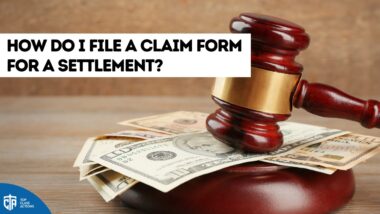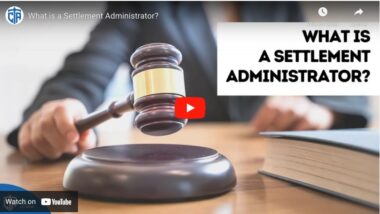Top Class Actions’s website and social media posts use affiliate links. If you make a purchase using such links, we may receive a commission, but it will not result in any additional charges to you. Please review our Affiliate Link Disclosure for more information.

But many people don’t know what to do with these notices in the mail. Sometimes they look like junk mail, or maybe even a scam. Notices sent via email may go straight to your spam folder.
The truth is that these notices are earnest attempts to notify you about your opportunity to benefit from a class action lawsuit.
What Exactly is a Class Action Lawsuit?
When we’re hurt by a company—for instance, because of a defective product, neglectful care, or deceptive practices—pursuing litigation is a method of righting that wrong. It can hold the company responsible for the harm done to us accountable for their actions and inactions.
Sometimes the actions of a company affect not just one person but a large group–potentially hundreds or even thousands at a time. Class action lawsuits are often filed because of defective products that place consumers at some kind of risk, deceptive business practices that attempt to wring consumers of their money, or common labor law violations.
In these cases, it can make sense to provide relief for an entire “class” of affected persons, rather than forcing them to file hundreds or thousands of separate lawsuits over the same issue. In these cases, representative plaintiffs work with class counsel to litigate a single proceeding on behalf of all Class Members involved in the litigation.
How Do Class Actions Form?
There are a few important steps to make a lawsuit qualify as a class action.
The most fundamental requirement is for the court to certify the proposed Class. The rules for class action certification can vary from state to state, but many follow the requirements set in the Federal Rules of Civil Procedure (FRCP). Under these federal rules, for a class to be certified, these requirements must be met:
- The vast number of potential participants should make it “impracticable” for all members to join in one regular lawsuit. This numerosity requirement doesn’t have a set number, but typically these allegations involve at least a few dozen class members. The location of Class Members across the country is often a factor for consideration.
- There must be “common questions of law or fact” that stretch across all cases, between each individual potential member.
- The representative plaintiff’s own claim should be representative (that is, the same or very similar) of the claims held by all Class Members.
- The class representative must be able to fairly and adequately protect the Class’s collective interests.
What is Included in a Notice of Class Action?
A class action notice is sent out to potential Class Members. The notice is meant to alert consumers that they may have been affected by this issue, and therefore may be eligible to join the class action lawsuit and pursue compensation. Until they get this notice, they may not even be aware that they have been affected by the defendant’s actions.
After the Class is certified (or when a Class has been proposed for settlement purposed), the defendant, the plaintiffs, and the court will then work to identify any individuals who may be eligible to participate in the class, and are subsequently required to make a “reasonable effort” to contact each Class Member to notify them that the legal action is taking place.
Rules for what a class action notice has to include varies from state to state and at the federal level. The FRCP states that the notice has to lay out the basic information of the case “clearly and concisely … in plain, easily understood language.” This information has to include:
- The nature of the case
- The specific allegations being made against the defendant
- The right to “opt out” of the class action
- The binding nature of any settlement or judgment on Class Members
I’ve Received Notice—What Do I Do Now?
If you have already received a notice of a class action lawsuit, that means the parties and the court believe you qualify as a Class Member. You don’t need to do anything else to join the Class.
In most cases, it’s up to the parties to settle the claims with some kind of agreement (and without going to trial). If the parties agree to settle, that’s when you’ll receive a notice informing you that the class action has reached a settlement.
Class Members usually (though not always) must make a claim to get what the settlement entitles them to. Claims are usually handled by the settlement administrator, a business that specializes in handling the notice and payment requirements in class action settlements.
Can I Opt Out of a Class Action?
Class Members don’t have to accept the terms of the settlement. If they want, they can opt out.
Any class action notice should mention that you are able to opt out of participating. Opting out leaves you legally free to file your own lawsuit against the defendant, even if the class action itself is dismissed. It also means you would be excluded from the Class and any compensation that may occur as a result.
Class Members who don’t opt out generally lose their right to pursue a claim against the defendant based on the same issued. They can lose this right whether or not they make a claim from the settlement.
Why Participate in Class Action Litigation?
Pursuing a class action suit can never take away the pain and suffering caused by these issues, but they can at least help you recover compensation, which can help with medical bills, lost wages, and more.
I Think I’m a Potential Class Member, But Didn’t Receive Notice—What do I Do?
While both parties and the court are required to do their best to identify and contact any potential class members with a notice, they may miss certain individuals.
If you suspect that you qualify as a Class Member in a class action but didn’t receive notice, you can contact the settlement administrator to find out if you are a Class Member and how you can make a claim.















7 thoughts onWhat Does It Mean to Have a Class Action Lawsuit?
I am CONSTANTLY contacting admins about not receiving notice with ID number in order to file or choose payment on suits I know for a fact that I am or should be including in that for whatever reason I was never included or contacted and they are zero help!! they say “you would have received notice” yeah well these notices go straight to your junk box and are not always received or blocked on texts as unknown texts and blocked I mean come on!!! can you imagine what life would be like if we had to remove all our blocking systems from our computers and phones just so we don’t possibly miss a one time contact notice??? as we speak there are 2 that require a pin and I have contacted but received no help and it pisses me off! all class members should have the right and ability to at the very least file a claim!!
Prosecutors select Portfolio Services I hate this people shit
How can I start a class action suit?
CVS claim form toilet wipes 2018 2019 2020
CVS toilet wipes not flushable
Several Class Actions Involving: Apple Products SHOULD have included me and DID NOT-
I am aware this has happened in other cases-
(My prior Honda, for example)
Is there a law? About contacting class members?
I think I have a very strong class action lawsuit. How should I proceed?